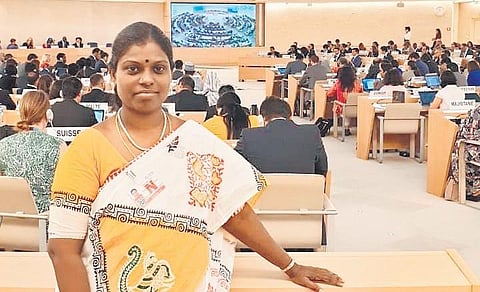

CHENNAI: It was in 1989 that American lawyer, civil rights advocate and philosopher Kimberle Williams Crenshaw coined the term intersectionality to describe how characteristics like race, class and gender intersect and determine the course of an individual’s life and lived experiences. It was in the context of Black women’s state of affairs in the US. Applying the same principles here, Ruth Manorama, Dalit social activist, remarked that Dalit women and thrice discriminated against and alienated on the basis of caste, class and gender, making their deprivation unique and systemic. So began Prajnya’s Equality Colloquium Series, encompassing the repercussions of lack of equality, denial of human rights and the persistent injustice in the name of caste in one question — Do Dalit Women Matter?
Taking the discussion forward was Abirami Jotheeswaran, general secretary of All India Dalit Mahila Adhikhar Manch. While the country has recently woken up to the presence of patriarchy in every aspect of life and decided to passively take a stand against it, reality has not been the same for Dalit women, she began. While upper caste women face patriarchy, Dalit women are held in place by Brahminical patriarchy and that’s why caste plays a huge role in how they experience it, she said.
“Brahminical patriarchy plays a critical role in keeping women down. More than 90 per cent of women involved in the Devadasi practice are Dalit women. More than 95 per cent women engaged in manual scavenging are Dalit. For instance the Sumangali Scheme in textile mills (particularly in the Coimbatore region) — where more than 60 per cent of the women and girls, who on the promise of getting money for dowry, are forced into bonds at these jobs, are Dalit. It’s clear that it’s not just a gender issue; it’s a caste and gender issue,” she elaborated.
Other markers of socio-economic development too point to Dalit women’s disadvantageous state in every hierarchy. “There’s 99 per cent of enrolment at the primary school level. It’s a good sign. But, when it comes to higher education, Dalit girls make up only 15 per cent of the total strength. In between, there’s a lot of discrimination, structural problems and different forms of violence. If you look at employment, Dalit women’s is more than non-Dalit women (24 per cent vs 18 per cent) and we have to say it is because of poverty,” she detailed.
Even as the Indian Constitution abolished untouchability, 73 years on, Dalit women continue to face this practice in many forms. All you need to illustrate this is the crime reports from across the country, it seems. Pulling out select examples from the past two years, Abirami talked about a Dalit minor girl being murdered in retaliation over a land dispute in Madhya Pradesh, a Dalit woman gang-raped for seeking legal recourse, and a Dalit woman beaten up and denied ration distribution even amid the COVID-19 lockdown in Uttar Pradesh.
She went to discuss the details of the Hathras case to illustrate every law and norm that gets thrown out the window when the victim is Dalit. Even as India boasts of a number of laws to provide justice to the marginalised, it largely fails in its implementation, she remarked.
As a means of reparation, she suggested that we need to focus on implementation and forward action. Starting with the collaboration of the Ministry of Social Justice and Ministry of Women and Child Development to address all issues related to Dalit women. She also talked about the importance of Dalit women in the Parliament, remarking, “No one is ready to even nominate women to the Rajya Sabha.” She concluded her talk with the demand that feminism in the country must be intersectional and address Dalit women’s issues.
Earlier in the interaction, Manorama quoted BR Ambedkar to drive home a point about Dalit feminism “He measured the progress of a community by the degree of progress which women have achieved. That’s why Dalit feminism is not only against caste and untouchability; it is anti-class, we’re against the rationality behind poverty, anti-gender imperialism. It is inclusive, intersectional and envisions a gender-just society. It is also rooted in social justice and equity. Therefore, I call upon sisters in the feminist movement and progressive social movements to be strategic allies in the agenda of women’s emancipation,” she declared. How many will answer the call?